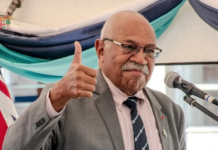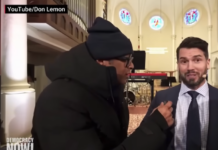New China TV video clip of the historic moment
Report by Pacific Media Watch
Delegates from 195 nations have reached an unprecedented agreement on global climate change in the French capital after years of often fruitless negotiations for a legally binding deal to limit carbon emissions.
French Foreign Minister Laurent Fabius brought the historic UN negotiations in Paris to an end as relieved ministers stood for several minutes to applaud, reported Al Jazeera.
“I see the room, I see the reaction is positive – I hear no objection. The Paris climate accord is adopted,” Fabius declared, officially ending the summit with a knock of a little green hammer.
“It may be a small gavel but it can do big things,” he said.
But Pacific commentators were quick to criticise the 31-page pact dubbed the “Paris Agreement” with Fiji-based Islands Business editor Samisoni Pareti tweeting from Paris: “Not a good deal for the Pacific … 2 watered down, no below 1.5, no loss n (sic) damage, God save the Pacific!

Greenpeace International executive director Kumi Naidoo praised the Pacific and small island states for pushing for the 1.5C goal, saying: “We have a climate deal, but what it’s happens next that matters.”

The landmark deal comes after negotiators from key nations – including China, the United States, and India – gave their approval to a draft accord presented by host France earlier in the day.
Road map
The pact limiting greenhouse gas emissions provides the world with a road map for breaking away from fossil fuels that have powered the global economy since the Industrial Revolution.
The deal – to take effect from 2020 – ends years of disagreement between rich and poor nations over how to carry out what will be a multi-trillion-dollar effort to slow down global warming and deal with its consequences already occurring around the planet.
Read more: Will the climate deal be enough to save the planet?
“We have opened a new chapter of hope in the lives of seven billion people on the planet,” said India’s Environment Minister Prakash Javadekar.
“We have [the planet] on loan from future generations. We have today reassured these future generations that we will all together give them a better Earth.”
Cap on greenhouse gases
To do so, the emissions of greenhouse gases will need to peak “as soon as possible”, followed by rapid reductions, the agreement states.
The world has already warmed almost 1C, which has caused major problems for many people around the world – particularly in developing countries – such as more severe storms, droughts, and rising seas, according to scientists.
Developing nations had insisted rich countries must shoulder the lion’s share of responsibility for tackling climate change as they emitted most of the greenhouse gases since the Industrial Revolution.
The United States and other rich nations countered that emerging economies must also do more.
On the crucial issue of financing, developed countries agreed to muster at least $100bn a year from 2020 to help developing nations.
However, following US objections, it was not included in the legally binding section of the deal.
US Secretary of State John Kerry called it “a victory for all of the planet and for future generations”.
“This is a tremendous victory for all of our citizen…. We have set a course here. The world has come together around an agreement that will empower us to chart a new path for our planet, a smart and responsible path, a sustainable path,” he said.
Environment groups said the Paris agreement was a turning point in history and spelt the demise of the fossil fuel industry.
The agreement includes an objective to limit global warming to “well below 2C above pre-industrial levels” and “pursue efforts” to limit the temperature increase to 1.5C.
Source: Pacific Media Watch 9520







































